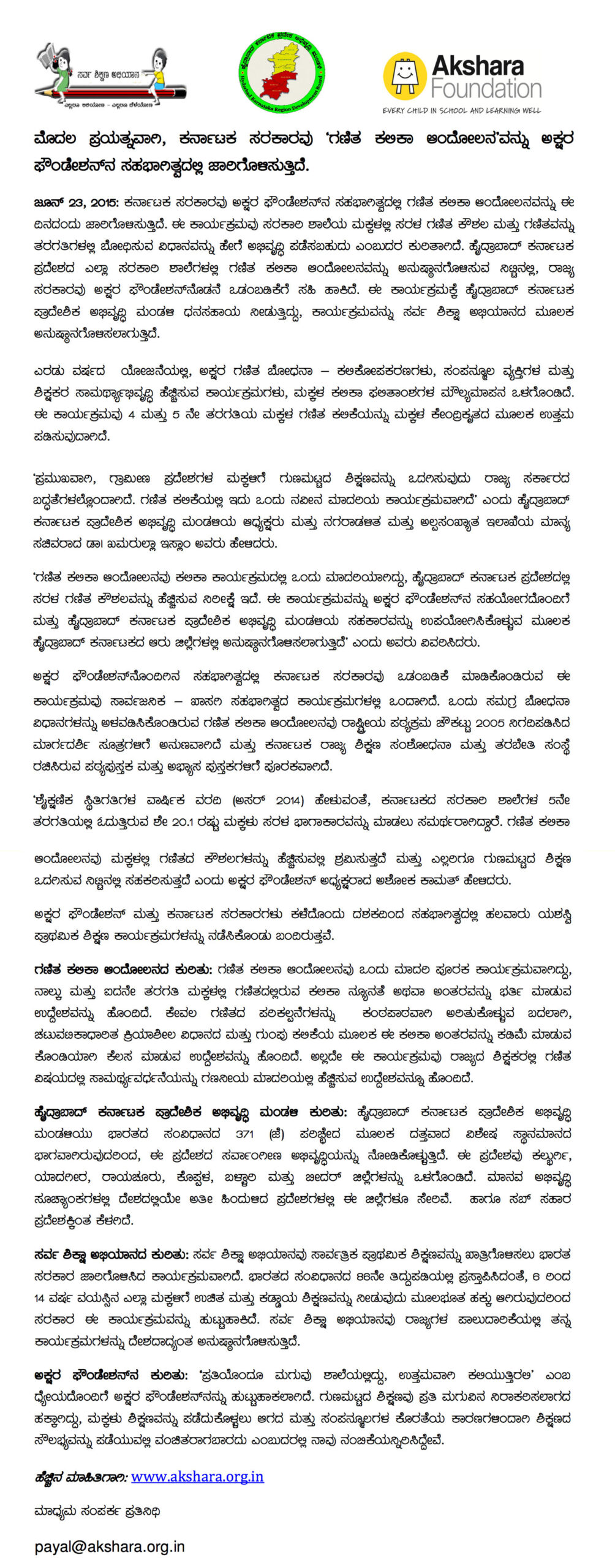
In a first, Karnataka State Government rolls out Ganitha Kalika Andolana in collaboration with Akshara Foundation.
June 23, 2015: The Karnataka State Government in collaboration with Akshara Foundation, today rolled out Ganitha Kalika Andolana (GKA) – a program to improve numeracy skills and facilitate classroom teaching of Mathematics among students in Government primary schools. Starting with all the schools in the Hyderabad Karnataka Region, the state government has signed a Memorandum of Understanding (MoU) with Akshara Foundation to implement GKA. The programme is financially supported by Hyderabad Karnataka Area Development Board (HKADB) through Sarv Shiksha Abhiyan (SSA).
The two-year plan includes provision of Akshara Ganitha teaching and learning material, capacity building of resource persons and teachers and assessment of children’s learning outcomes. The programme will focus on 4th and 5th standard students to improve proficiency in Mathematics in a child-centric manner.
“This is a leap forward towards the state government’s commitment to provide quality education to students especially in the rural areas. The program is an innovative way to improve learning in Mathematics,” said Dr. Qamarul Islam, Chairman, Hyderabad Karnataka Area Development Board and Hon. Minister for Municipal Administration & Minority Affairs.
“GKA will be a model learning programme to make the children of Hyderabad-Karnataka Region, lead in numeracy skills. The program has been rolled out in six districts of Hyderabad-Karnataka region in collaboration with Akshara Foundation and utilizing the assistance from Hyderabad-Karnataka Development Board,” he added.
The partnership with Akshara Foundation is one of the first that the state Government has entered into in the spirit of public-private partnerships. The comprehensive teaching methodology envisaged in GKA program is compliant with the guidelines prescribed by the National Curriculum Framework 2005 and supports the textbooks and workbooks designed by the Karnataka Department of State Educational Research and Training (DSERT).
“The Annual Status of Education Report 2014 (ASER 2014) has revealed that only 20.1 percent of 5th standard students in government schools in Karnataka can do simple division. Ganitha Kalika Andolana will help improve the poor Math proficiency levels among children and work towards quality education for all,” said Ashok Kamath, Chairman, Akshara Foundation.
Akshara Foundation and the State Government have collaborated over the past decade on many successful primary education initiatives.
About GKA: Ganitha Kalika Andolana is a model support programme aimed at bridging learning gaps in math among children in standard four and five by using an activity based creative approach and peer learning rather than rote application of mathematical concepts. The programme also aims to build significant math capacity among teachers in the state.
About HKADB: The Hyderabad-Karnataka Area Development Board looks at the overall development of the region which has been granted special status under Article 371 (J) of the Constitution by the Union government. The region constitutes of the districts of Gulbarga, Yadgiri, Raichur, Koppala, Bellary and Bidar.. These districts are among the most backward regions of the country with Human Development Indices (HDI) below the sub-Saharan levels.
About SSA: Sarva Shiksha Abhiyan (SSA) is Government of India’s flagship programme for achievement of Universalization of Elementary Education (UEE) in a time bound manner, as mandated by 86th amendment to the Constitution of India making free and compulsory Education to the Children of 6-14 years age group, a Fundamental Right. SSA is being implemented in partnership with State Governments to cover the entire country.
About Akshara Foundation: Akshara Foundation was set up with a mission to ensure Every Child in School and Learning Well. We believe that quality education is the undeniable right of every child and children should not be deprived of it just because they do not have access to it or the resources to realise their dreams.
Visit: http://www.akshara.org.in
Media Contact: payal@akshara.org.in



